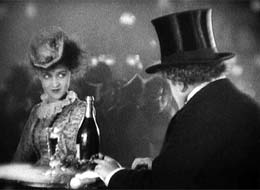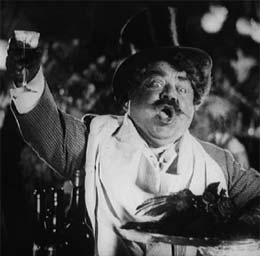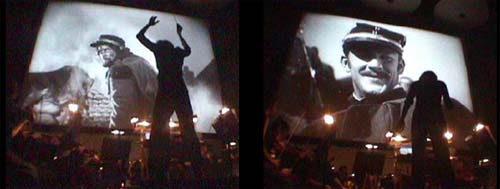|
|
|||||
NEW BABYLON IN PERFORMANCE As one of the last great film masterpieces of the Soviet avant-garde and the last of Kozintsev and Trauberg's FEKS group, New Babylon represents an early climax of the directors' artistic talents. Made when they were in their mid - 20's and featuring the notorious avant garde acting school they had founded in post revolutionary Leningrad, The Factory of the Eccentric Actor. (whose 1922 manifesto ECCENTRISM, may be read by clicking HERE ), New Babylon tells the story of the great lost historical moment of the 19th century; the failed revolution of the Paris Commune of 1871.
To write the music for their film, the directors enlisted the precocious
talent of the young Dmitri Shostakovich, who at the age of 23, had
swiftly risen to fame in the Soviet music world with his highly
successful First Symphony (1925) and his opera The Nose (1928).
Although known at the time mainly for his concert works, Shostakovich
was no stranger to the cinema. As a student he had earned money
accompanying silent films at a number of Leningrad's cinemas. He
disdained the work, commenting that it "all undermined my health
and nerves," and annoyed by the difficult hours, tyrannical
theatre managers, unsympathetic audiences and what he felt was a
cheapening of the art of composition, Shostakovich swore never to
work in the cinema again. His departure would be short lived, however
as he signed onto the New Babylon project only a few years later
and would go on to compose over 30 film scores, spanning his entire
career. Shostakovich's score, completed in less than three weeks, is a
masterpiece of contrasts responding to and interacting with the
fast visual and emotional cuts of the film. With its fast cutting
and dynamic pace the work had no precedence in the USSR and it was
in fact intended to have been the Soviet Union's first sound film.
As a composer, Shostakovich was disturbed by contemporary live film music accompaniment practices which merely "illustrated the frame" and called these 'the most absolute garbage". Together with Kozintsev and Trauberg, Shostakovich instead intended to link the music to the inner actions and emotion of the film. New Babylon was to open on 18 March 1929 but, though the directors
began work in February 1928, Shostakovich only signed the contract
on 28 December, leaving less than eleven weeks to write a 90-minute
score. Adding to the pressure, he was simultaneously scoring for
Meyerhold's Moscow staging of Mayakovsky's Bedbug, as well as teaching
in Leningrad and preparing a concert - and all this while suffering
a severe bout of flu. Commuting between the two cities, Shostakovich
wrote 23 items for the play and, after watching the film twice and
timing each scene, delivered the piano score (Trauberg claims) after
only two weeks. However long it took, Shostakovich was well-paid:
2,000 roubles was around 15 months average worker's salary.
In a speech published just one week before the film's premiere,
Shostakovich described his approach to the music for New Babylon.
His two principal techniques were "the principal of obligatory
illustration," and the "principle of contrasts" .
In the former the music reveals the true inner meaning of a scene
despite the images we may see on the screen. With the "principle
of contrasts" on the other hand, the music is intended specifically
to contradict the meaning of the images. To achieve these effects
Shostakovich styles and tunes, distorting, juxtaposing and superimposing
- sometimes all at once - according to the development of the film
in which the music's "fundamental aim is to keep to the rhythm
and variations of the film, to augment the force of its impact."
Since the mid 1970's when a manuscript of Shostakovich's score was made available to the west several efforts have been made to reconcile the film and the complete score. Given the different versions of the film in circulation this has proven to be a thorny task, made more complex still by the fact that at least two different manuscript versions of the score also circulate, neither of them complete. The 2006 centenary reconstruction of New Babylon restores all originally
cut filmic materials and projects the film at its intended constant
sound speed of 24 frames per second, for which the music was scored.
It is intended for performance with the DSCH 2004 critical edition
of the full score as composed by Shostakovich before the last minute
re-edit of the film.
This full arrangement was never publicly performed by the full
thirty piece orchestra which Shostakovich intended. The composer
at the piano, however himself performed it at two preview screening
performances which took place on the 20th and 21st of February 1929,
three weeks before the premiere - a chaotic and controversial event
which brought about the film's swift disappearance from the screen
and its loss to world cinema for over 78 years, in its original
form.
|









